It has been 40 years since the release of The Long Good Friday, a gangster film still revered as one of the best British movies of all time. Shot in London in the late 1970s and starring the late Bob Hoskins and Helen Mirren, it told the story of an underworld boss trying desperately to stop the IRA from dismantling his empire.
The backdrop for the film was the London Docklands, then mostly undeveloped. With corrupt city planners in his pocket, Hoskins’ character – the pugnacious, barrel-chested Harold Shand – attempts to woo the New York mafia into a partnership to transform the area, selling the idea to them with a speech during a trip up the Thames on his yacht. “Our country is not an island any more,” he snarls. “We’re a leading European state. And I believe this is the decade in which London will become Europe’s capital … no other city in the world has got, right at its centre, such an opportunity for profitable progress.”
Then, mayhem. Prophetic, political, but above all bloody and brutal, the film won critical acclaim in the UK. Empire has ranked it among the top 20 British films ever made, while the New York Times described it as “a swift, sharp-edged gangster story in a classic mould”.
What was it like to make? To mark the 40th anniversary of its general release, the Guardian spoke with three members of the cast: Mirren, Derek Thompson and Paul Barber.
They retain a special affection for The Long Good Friday, and for Hoskins, who died in 2014. It was a film that brought together an unusual and chaotic ensemble to create something they all regard as unique.
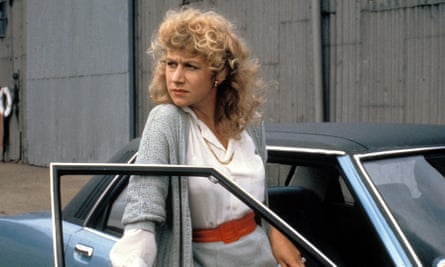
‘It gave me fantastic cred in the East End’
Helen Mirren, who played Victoria, Shand’s wife
The London gangster movie has become a bit of a cliche, but back then it was fresh territory. Nobody had done a movie like that as far as I can recollect. It broke ground.
I am a Londoner, I was born in London, I went to college in London and my career was in London. And this was a London-based film – so full of energy, so full of rawness.
When I first read the script by Barrie Keeffe, I was blown away. It was like a piece of literature, and movie scripts don’t tend to be like that. This one you read like a novel. With the exception that my female character was terrible – she was very, very dull.
She was basically the girlfriend in the corner, and I wanted to bring her into the story. So I signed up with great alacrity and excitement, with the caveat that I wanted to change Victoria – very much to the irritation of the director John Mackenzie. I was a squeaky wheel being very annoying.
Originally Victoria was just a working-class girl sitting pretty saying: “Oh Harold, do you think you ought to be doing that?” And I said: “No, let’s make her middle class or even upper middle class.”
The kind of girl who might have grown up in a nice house in Kingston. Not posh-posh. Maybe her dad was a very successful car dealer. She is smart and intelligent. She brings class to Harold’s operation, and he needs her.
Victoria was the only one who could control him … part of his success is that he has her on his arm, and in his office. I wanted to make her more influential in the plot. That was my contribution, and the film was much better for it, I think.
There was a crackling energy around Bob and John, and around me to a certain extent. Bob was just electrifying. It was the role of his life. That feeling of being a bomb that’s about to go off. In reality, he wasn’t terrifying, but he did have all that energy. He was an incredibly generous and kind guy.
Did I know it was going to turn out the way it did? I knew that Bob was giving an amazing performance. But I wasn’t so knowledgeable about film-making then, so I really wasn’t aware what a muscular, visceral piece of work it was.
I didn’t know, but John was at the height of his career. He knew.
It’s up in my list of the top five films I have been a part of. The timing of it, the originality of it. The film had depth. It gave me such fantastic cred in the East End. In every pub I went into people bought me drinks!
The irony is that an uncle of mine by marriage was a bona fide East End gangster of a generation just before and after the second world war.
I live in Wapping now and can see what Harold was talking about pre-Canary Wharf. At the time that part of London was still very bombed out. It’s amazing to look at the landscape now. The historical statement of London at that period, you can see it with your own eyes. Fascinating.”
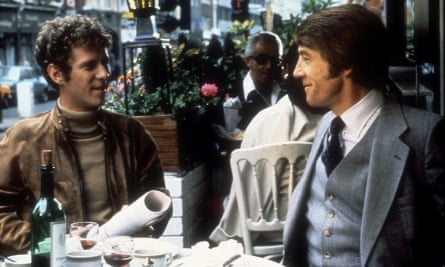
‘It was like the wild west. These guys meant business’
Derek Thompson, who played Jeff, Harold’s double-crossing consigliere; he gets killed with a broken bottle
It was such a great bunfight. I remember thinking it was blessed. Every angle felt positive and exciting: you didn’t know where things were going to land, but at the same time you felt this was all falling into the right place.
And for me that happened on day one. Bob came along and we did a read-through of the “bottle in the neck” scene.
That was actually a sabre scene – originally they had two sabres displayed on the bulkhead of his boat, and when he lost his temper he ripped one down and cut Jeff’s head off. I don’t know whether it was budget considerations or good taste, but they cut it.
I had done feature film work before and found it slow and quite miserable. But this wasn’t like that. It was like the wild west: these guys had come to town and they meant business. It was like theatre, and it was developing all the time. John was known as “Frenzy Mackenzie” because he could never keep his hands still. And Barry was no slouch as a playwright. He was full of compassion, brutality and humour.
You didn’t feel like you were with a bunch of experts, which is the most deadly feeling in the world. You felt like you were with a bunch of enthusiasts. The way that Bob and Helen worked together and how that relationship developed was beautiful to witness. And I watched Helen pushing it in the right direction. She brought her character out into the light. I did the opposite.
I had a view of Bob that hasn’t changed. He was a combination of Noam Chomsky and Harpo Marx. He had an extraordinary wisdom that you could absolutely trust. He was really articulate, and as cheeky as a five-year-old.
Whoever you scratch will come up with the same reply: a lot of good talent amalgamated to create The Long Good Friday. Everyone was right at the top of their game, but what was under the bonnet was Bob Hoskins.
The film was one of the best showcases for his work, but almost everything I saw him do, I’d think: “That was at the top end of the scale.”
I think the film fits in with some of the best theatre I have done and enjoyed the most. I don’t think of it in the way most people do. Those are the best memories – to remember it as it was and not by its reputation.
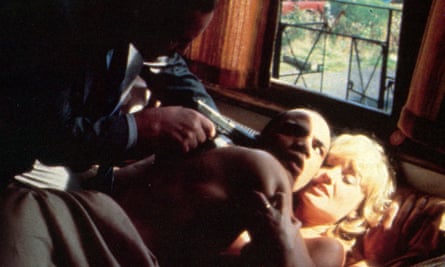
‘I’d been drinking. They had to pour coffee into me before my scene’
Paul Barber, who played Errol the Ponce; he is interrogated by Harold and his henchman
I was doing a play for Barry Keeffe called Sus, which was all about the Sus laws – stop and search it’s called now. One day, he came up to me and said, “Listen, I have a film in production, and I would like you to see John Mackenzie – this is the script.”
I went along to Brixton, where they were filming the scene, and John said to me: “Go and wait in the pub and learn your lines.” I had a couple of drinks, so by the time I had to do the scene being pulled out of bed, the costume lady had to pour coffee into me before I went on to the set.
There was no audition, I just jumped straight in. I didn’t have a clue what it was about. I remember standing in front of PH Moriarty and Bob Hoskins … and I was scared. I thought: “Oh my God, what am I doing here? This guy’s a gangster.” It was my first time doing stuff like that. I thought I was involved in a snuff movie. They were interrogating me. PH Moriarty [who played Razors] had a machete. They called him the human spirograph because he had so many scars. I played it fearful because I was.
I was genuinely nearly crying when they did that take. Bob looked at me as if to say: “You have melted me heart mate.” He was great – so generous, so patient.
Years later, we were invited to a polo match in Windsor. It was just after I had done The Full Monty. Bob was there as well and at half-time, when all the horses and players go off the pitch, we had to go on and press the divots. I said to Bob: “What are we supposed to be doing? And he was, like: “I don’t fucking know … why are we here?”
The thing that got me was Harold’s speech on the boat. Think about it now: it has all happened. It was the Thatcher era and he was like the young Del Boy.
I think Barry said when he first wrote it, it was going to be called England for Sale.
Amazon, McDonald’s. We are being sold down the river. Those words are still relevant today: England for Sale. That’s what I cannot get out of my head. It has has been sold.
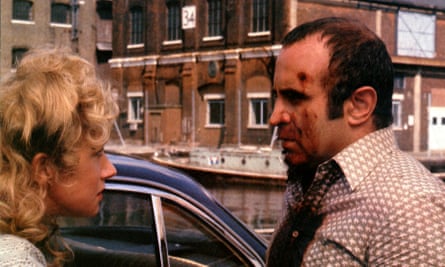
In Harold’s own words …
After being told the body of one of his henchmen would be collected in an ice-cream van “to keep it all incognito”: “There’s a lot of dignity in that, isn’t there? Going out like a raspberry ripple.”
Telling the New York mafia what he thinks of them: “Shut up, you long streak of paralysed piss … What I’m looking for is someone who can contribute to what England has given to the world: culture, sophistication, genius. A little bit more than a ’ot dog, know what I mean?”
“I’m glad I found out in time just what a partnership with a pair of wankers like you would’ve been. A sleeping partner’s one thing, but you’re in a fucking coma! No wonder you got an energy crisis your side of the water!”
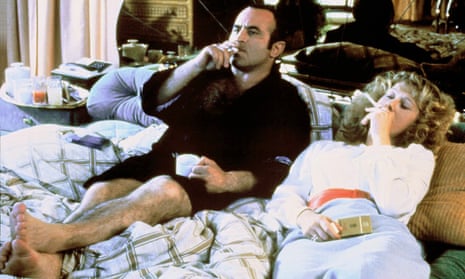

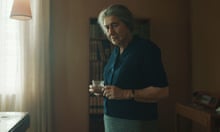
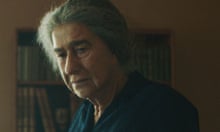
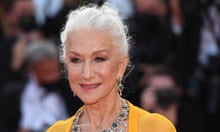
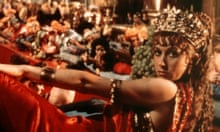
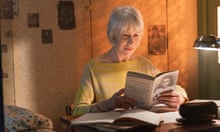
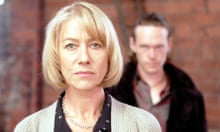
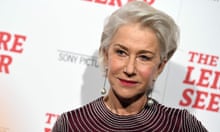


Comments (…)
Sign in or create your Guardian account to join the discussion